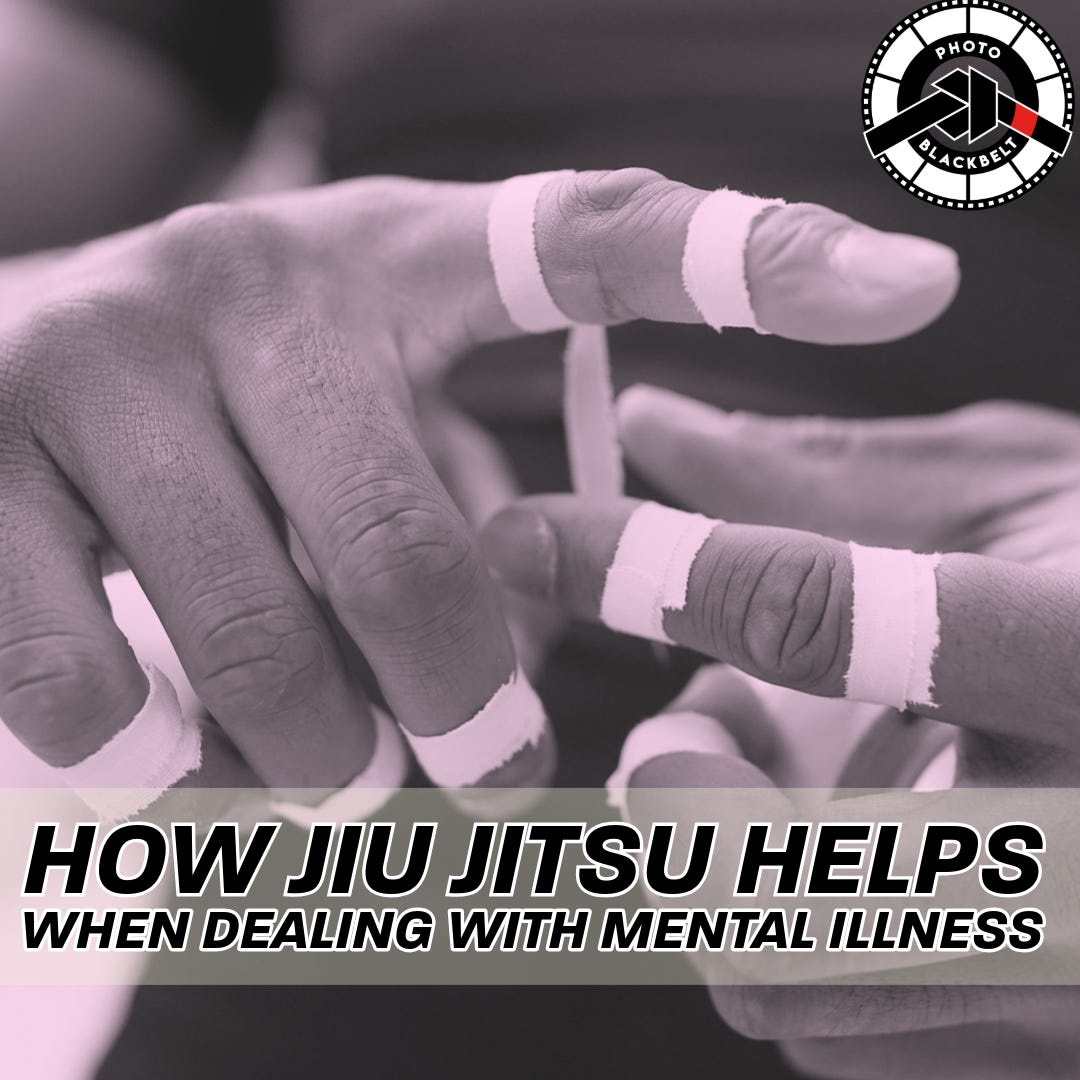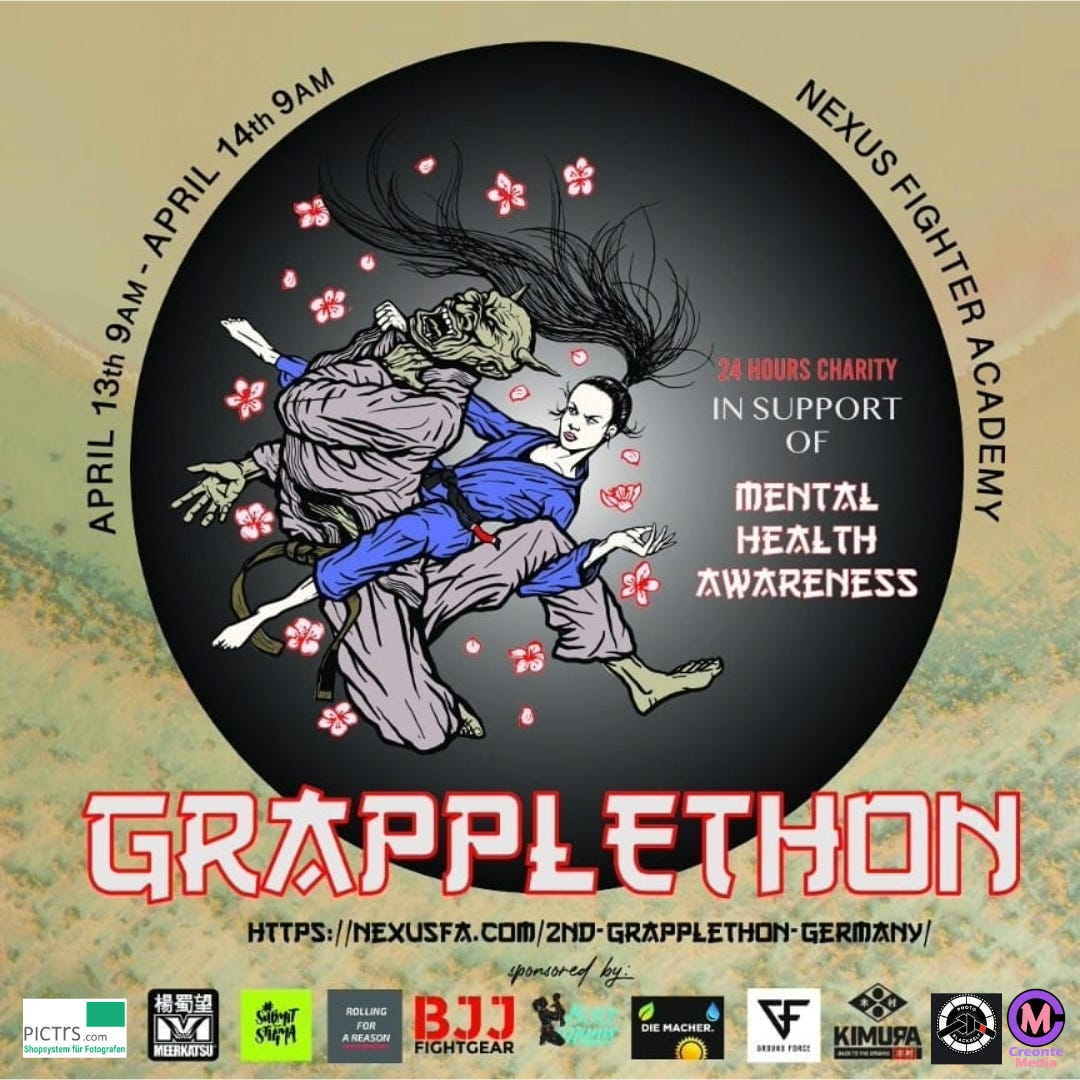How Jiu Jitsu helps when suffering with mental illness
We take a look at how Jiu Jitsu can be a form of therapy for people suffering with mental illnesses.
© Photoblackbelt / Chiara Dazi
Depression and mental illnesses have many manifestations. Sometimes the most normal-looking people might be going through a depressive episode right in the middle of their workspace. But then again isn’t normal subjective and what exactly is being normal in a world where everyone is fighting for something? Be it a better career, more money, a relationship or even fighting to reach a certain place by a certain time. Quite often my Instagram algorithm has shown me a quote card that says, “Be kind to people, you have no idea what they are going through”. As true as that may be, I find it hard to fathom that we live in a world where ‘being kind and nice’ is frowned upon, or so, like pop culture tells us. But then again we live in a society where mental illnesses despite all efforts to spread awareness are still looked through the lens of taboo and stigma.
So how can a sport where you are smashed for the first six months to a year of training, Jiu Jitsu, help in dealing with mental illness, or is it just another marketing gimmick of a stereotypical slogan that the BJJ community has called ‘Jiu-Jitsu saved my life’? But more than that, does Jiu Jitsu have those components to help someone deal with a depressive episode, acute anxiety, PTSD, and trauma? Let us take a look.
Hijacking the mind
Jiu Jitsu is like any other sport where you sweat. Just like when you complete a workout at your local gym or play a round of football. Jiu-Jitsu is no different than that, it is a sport that helps you to sweat and release endorphins and dopamine. Endorphins and Dopamine are both chemicals in your body that make you happy. While the former relieves pain and stress naturally, the latter helps boost your mood and is involved in the reward circuit in your brain.
So when you sweat after a tough competition class and think the world is all sunshine and rainbows, it is your brain releasing those two chemicals that give you a high of some sort. Physical exercise has proved to help in aiding in dealing with mental illness. Exercise improves mental health by reducing anxiety, depression, and negative mood and by improving self-esteem and cognitive function. There is also a study that shows that exercise is imperative for schizophrenic patients.
Exercise and just physical work have personally helped me immensely in dealing with depressive episodes. It is something that during those periods I do not want to do and yet I know that if I do them, I’ll feel better, only if for a wee bit. However, it is that exercise that releases those dopamine and endorphins after every Jiu-Jitsu session that, in a way, has helped me to alleviate my mood, even after being smashed constantly in the first year of training.
Exercise is like hijacking the mind, you are in a way forcing your body to produce chemicals that it won’t necessarily produce. One of the greatest thinkers of our time, Artur Schopenhauer, who suffered from chronic depression used to walk every day for 2 hours. When you exercise your body, you exercise your mind as well and hijack the system into alleviating your mood. Jiu Jitsu, like any other sport, offers that.
Being in the moment
I’ve talked to a lot of people like me in the Jiu-Jitsu world who suffer from chronic depression. And one of the things that we have always agreed on is that Jiu-Jitsu lets you be present in the moment. It is like a kind of Yoga, where you have to be aware of all the parts of your body, the balance, the positioning, everything, only in Jiu-Jitsu someone is trying to kill you, albeit in training. What it does is takes you away from this looming sense of always being in your head and lets you be in the moment.
Being in your head is one of the most critical problems associated with mental illness where you can think of all the weird permutations and combinations possible of a hypothetical situation that might not even be true. It is your brain flirting with the idea of ‘n’ number of situations, mostly all of them being false one way or another. What it also does is create a false sense of identity, belonging, and other factors which in turn affects our outlook on the world. So we view the world through the broken lens of mental illness and believe it to be the only view that can exist. Jiu Jitsu can take away all of that by letting you just be in the moment.
It lets you be in the moment where you can only think about Jiu-Jitsu and nothing else. How do I inch myself out of this situation or how do I accomplish this sweep or how do I manage this submission, is the only thing that runs through your mind instead of thinking about the demons that haunt you. What it does is that it keeps you out of your head and helps you to refocus and revitalize your mental system. Isn’t that why our problems, however mighty they might be, appear to be drawves in front of us, right after a Jiu Jitsu class?
Sense of belonging
All of us want to fit somewhere in the grand scheme of things. We want to belong to something greater than us. It gives us not only a sense of purpose that our lives amount to something bigger than us but it also gives us a sense of belonging. This sense of belonging is critical to being accepted as a functioning part of society.
Mental illness can lead to being ostracized from society. If not that, it can lead you to cutting ties with society and finding solace in your own company, it gives you this feeling of ‘people won’t understand me’; and I might go out on a limb and say that a lot of us who suffer from mental illness have very often wondered in one way or the other, “Where do I belong?”. When we ask that question, we ask ourselves ‘Will people accept us if we show our true selves? Will people want to be friends with us even despite our problems to hold relationships?”.
While Jiu Jitsu might not provide answers to all the questions that stem from a sense of belonging, it sure provides a community and rather, for the lack of a better word, diminished (In intensity) sense of purpose. In his book Tribe, Sebastian Junger writes about how people who go through tough situations together form a sort of bond, an interpersonal connection that helps them find a sense of belonging. In one way, Jiu Jitsu does that as well. Jiu Jitsu provides an egalitarian society where your mental problems, your financial value, the value of your phone are hardly key components in determining your value on the mats. It provides a safe space where it does not matter where you come from, you are accepted, regardless.
Creating Art and A Way Of Life
There is a reason why Jiu-Jitsu is called a martial art. Or any other combat sport is called art, because they are a form of expressing yourself, of letting your voice be heard through a particular way of expression. Some of the greatest thinkers, artists, painters, poets, writers, and actors of our time suffered from depression, and mental illnesses and used their art as a way of expressing themselves.
French philosopher Emil Cioran claimed that he would have committed suicide if he did not find writing. Much like Cioran, I believe that Jiu-Jitsu helped me immensely find a way in life, a way of expressing myself, and had I not found Jiu-Jitsu in my early twenties I would have imploded. The world becomes mundane and worthless for people who deal with mental issues. It feels like for me that someone has sucked my soul out of myself and in a very pop-culture way, that the world has lost its colors. In all of this, not only a way to express yourself but a way of life where there is an objective of getting better helps immensely to anchor through a huge wave.
Jiu-Jitsu can be a great anchor to help you develop good habits of taking care of your diet, exercising, learning a new skill, and being present in the moment. It is a paintbrush that you can use to create art, the way you like, with the colors you want.
Final Thoughts
In his work, The Book of Five Rings, Miyamoto Musashi writes, “You must understand that there is more than one path to the top of the mountain”. Jiu-Jitsu is one of those ways to the top of the mountain, but it is not the only way. Making your whole identity based on Jiu-Jitsu can also lead to huge mental problems when you go deeper into the rabbit hole. Jiu-Jitsu helps to find a way in life that a lot of us don’t have. Personally, Jiu Jitsu for me is one of those anchor things that helps me to better my life. But it is not the only thing. I use it in conglomeration with other hobbies that I have to keep me going, but I will admit that Jiu-Jitsu will always remain my safe space to go when I find myself going through a tough time off the mats.
That said, Jiu-Jitsu isn’t therapy. It is a form of therapy, maybe not even that, and chronic mental illnesses should always be treated through a professional first. Jiu-Jitsu is not that band-aid that will solve all your mental problems, it is a small step that you take in bettering your mental health. It is not THE step.
Taking a giant step to spread awareness for mental health in the Jiu Jitsu community, Nexus Fighter Academy will be organizing a 24-hour Grapplethon from April 13 (9 am) to April 14 (9 am). You can find all the information here. Please make sure to donate to a good cause and fight the good fight.
If you enjoyed reading this, share it with your friends. Or, click on the ❤️ button on this post so more people can discover it on Substack. And don’t forget to subscribe!



